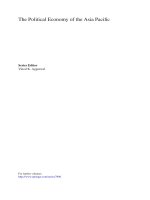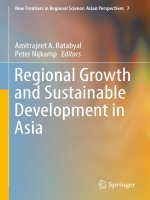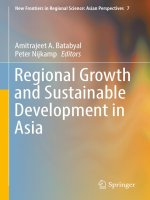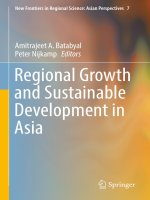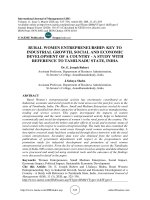Economic growth and economic development 185
Bạn đang xem bản rút gọn của tài liệu. Xem và tải ngay bản đầy đủ của tài liệu tại đây (75.1 KB, 1 trang )
Introduction to Modern Economic Growth
“...extending the coverage of crucial health services... to the world’s
poor could save millions of lives each year, reduce poverty, spur economic development and promote global security.” (p. i).
This third version of the geography hypothesis may be much more plausible than
the first two, especially since it is well documented in the microeconomics literature
that unhealthy individuals are less productive and perhaps less able to learn and
thus accumulate human capital. We will discuss both the general geography hypothesis and this specific version of it in greater detail below. But even at this point,
an important caveat needs to be mentioned. The fact that the burden of disease is
heavier in poor nations today is as much a consequence as a cause of poverty. European nations in the 18th and even 19th centuries were plagued by many diseases.
The process of economic development enabled them to eradicate these diseases and
create healthier environments for living. The fact that many poor countries have
unhealthy environments is, at least in part, a consequence of their failure to develop
economically.
4.3.3. Institutions. An alternative fundamental cause of differences in economic growth and income per capita is institutions. One problem with the institutions hypothesis is that it is somewhat difficult to define what “institutions” are. In
daily usage, the word institutions refers to may different things, and the academic
literature is sometimes not clear about its definition.
The economic historian Douglass North was awarded the Nobel Prize in economics largely because of his work emphasizing the importance of institutions in
the historical development process. North (1990, p. 3) offers the following definition:
“Institutions are the rules of the game in a society or, more formally,
are the humanly devised constraints that shape human interaction.”
He goes on to emphasize the key implications of institutions:
“In consequence [institutions] structure incentives in human exchange,
whether political, social, or economic.”
171



